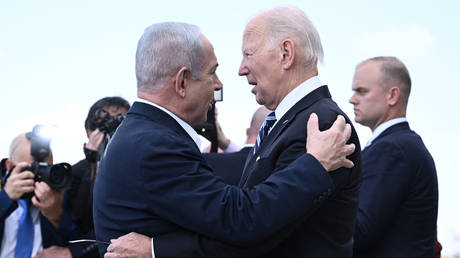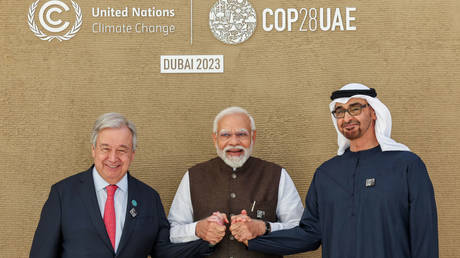As sanctions, cyberattacks, and surveillance are increasingly used by some powers to prevail over others, poorer countries should combine strength to pave their digital futures without any sovereignty risks
In the last few years, we have seen a worldwide pandemic, geopolitical conflicts, supply chain disruptions, and the weaponization of non-traditional aspects of the economy, especially the digital economy.
The weaponization of banking systems and digital platforms, systematic cyberattacks, and surveillance using telecommunications hardware has pushed states’ digital policymakers and national security leaders to establish a de-risking strategy in order to regain sovereignty over the digital realm.
What we mean by ‘de-risking strategy’ is developing trust-based partnerships where economic interests, historical linkages, shared values, and the competitive strengths of partners help them secure a resilient domestic digital economy. In these partnerships, we define trust in a broader sense, allowing states to pursue their national interests while ensuring economic security. In our paradigm, the states would pursue these partnerships to balance their immediate economic needs, build on historical linkages to deepen their relationships, disassociate gradually with states where a value conflict exists, and compete on their manufacturing and trade capabilities.
Another way for states to carve out a sovereign digital future would be for them to build on the foundations of historical relationships. We are also looking at developments where states deepen their historical partnerships in new areas to diversify their trade baskets.
Read more Global apartheid: How the colonial West continues to betray the rest of the world
Global apartheid: How the colonial West continues to betray the rest of the world
India and Russia have had strong nuclear, space, and defense ties; however, we now witness enthusiastic conversations on cooperation in IT, cybersecurity, and smart cities between Indian and Russian counterparts. Early this year, the 12th meeting of the Russian-Indian Working Group on Science and Technology explored synergies in biotechnology, artificial intelligence, quantum technologies, cyber-physical systems, oceanography, medical sciences, and fundamental and applied physics.
In the 2000s, economic growth, individual freedom, and global connectivity were states’ primary national priorities. Economic growth and connectivity incentivised states to open their economies to multinational corporations. States allowed the big technology platforms to set the norms of engagement in the digital world. Soon, there was a realisation that these platforms operated without accountability to local laws.
Malicious actors used these platforms to spread disinformation and manipulate public opinion. Unfortunately, these platforms were deployed by states and non-state actors to achieve their geopolitical ambitions. There have been rising instances of cyberattacks on businesses, government websites, and healthcare establishments.
Rising cases of breaches of data privacy through the use of social media platforms have pushed governments to enforce strict data privacy and localisation laws. If technology platforms are in constant conflict with states’ values, such as the rule of law and democratic accountability, then we are looking at a future where systematic restrictions are placed on these technology platforms being able to operate from the respective states’ jurisdictions.
States fear overt dependence on foreign technology for economic growth as it gives asymmetrical power to other states to weaponise this when relations are not on a strong footing.
Read more The AI race has started. Who is the main competitor to the US?
The AI race has started. Who is the main competitor to the US?
Besides sheer economic contingency, historical linkages, and shared values, we observe that states are bringing their combined competitive strengths to the table using multilateral institutional frameworks.
The digital world has no recognised borders, and therefore, it is difficult to establish responsibility for the behavior of a particular bad actor. The New Delhi G20 Declaration paved the way for countries to accept the One Future Alliance to equip the Low and Low Middle Income Countries (LMICs) to develop frameworks and strategies to pave their digital futures without any sovereignty risks. In addition, there was an emphasis on agreeing to principles that would govern the responsible deployment of AI for the common good and empower small businesses and farming communities.
The Indian model of digital public infrastructure (DPI) provides agency to states to pursue the best of private innovation and public accountability. Unlike the private technology platforms, the Indian DPI utilities build using open source architecture in the critical domains of digital identity, payments, banking, and health to ensure that personal data is stored under an established authority.
Access to this data is granted with consent from users using a techno-legal approach of Data Empowerment and Protection Architecture (DEPA), which ensures citizens’ own data is protected by laws and that at the same time, data is made available via anonymised and encrypted technologies to private businesses in a cost-effective manner to build innovative models. DPI with DEPA has helped India to balance sovereignty risks and business innovation interests. India has offered this deployment strategy as a global public good to LMICs and developed nations at multilateral and bilateral engagements.
Read more Trading in death responsibly: ‘Woke’ funds funnel $5 trillion into arms industry
Trading in death responsibly: ‘Woke’ funds funnel $5 trillion into arms industry
In conclusion, a de-risking strategy is a complex and multifaceted approach that seeks to balance the benefits of self-reliance and interconnectedness. It requires systematic planning, sustainable investment, and international cooperation to navigate the challenges and uncertainties of the digital age while safeguarding national interests. At no point do we consider that a de-risking strategy would lead to digital autarky, as this would go against states’ economic interests and historical partnerships. The de-risking approach follows the classical international theory of managing and avoiding risks.
Different states would pursue this differently. However, we do see a consensus in the developing world against the weaponisation of non-traditional security challenges, bringing the security dimension to the equation.
States would see long-term national security threats as outweighing short-term economic interests and pursue some form of digital isolationism with a clear demand for technology-sharing agreements and local manufacturing capabilities. We hope this phase of the de-risking strategy is transitory, as states would utilize multilateral forums like BRICS+, the G20, and SCO to de-escalate these tensions and build on confidence-building measures to balance sovereignty concerns and avoid an AI-led digital arms race.
This article was first published by the Valdai Discussion Club and edited by the RT team

 1 year ago
149
1 year ago
149






 English (US) ·
English (US) ·